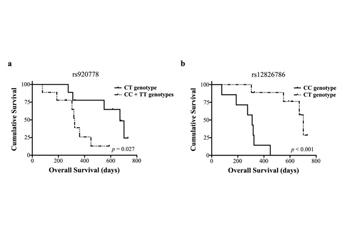Associação Portuguesa de Investigação em Cancro
Polymorphisms in HOTAIR have implications in the prognosis of glioma patients
Polymorphisms in HOTAIR have implications in the prognosis of glioma patients

The aberrant expression of the long non-coding RNA HOTAIR has been implicated in the aggressiveness of several tumor types, including glioma, the most common primary malignant brain tumor. Single nucleotide polymorphisms (SNPs) in HOTAIR were shown to be associated with the risk to develop several tumor types, but their role in glioma was elusive. In this study we show that genetic variants of the SNPs rs920778 (C>T) and rs12826786 (C>T) do not confer risk to develop gliomas in a population comprising 177 Portuguese glioma patients and 199 cancer-free controls. However, our results indicate that both rs920778 CT and rs12826786 CT genotypes were significantly associated with longer overall survival of WHO grade III anaplastic oligodendroglioma patients. Thus, these SNPs may be important prognostic factors in anaplastic oligodendroglioma patients.
Authors and Affiliations:
Ana Xavier-Magalhães1,2*, Ana I. Oliveira1,2*, Joana Vieira de Castro1,2, Marta Pojo1,2, Céline S. Gonçalves1,2, Tatiana Lourenço1,2, Marta Viana-Pereira1,2, Sandra Costa1,2, Paulo Linhares3, Rui Vaz3, Rui Nabiço4, Júlia Amorim4, Afonso A. Pinto5, Rui M. Reis1,2,6, Bruno M. Costa1,2
1Life and Health Sciences Research Institute (ICVS), School of Health Sciences, Campus de Gualtar, University of Minho, 4710-057 Braga, Portugal;
2ICVS/3B’s - PT Government Associate Laboratory, Braga/Guimarães, Campus de Gualtar, University of Minho, 4710-057 Braga, Portugal; 3Department of Neurosurgery, Hospital S. João, Porto, Portugal;
4Department of Oncology,
5Department of Neurosurgery, Hospital de Braga, Braga, Portugal;
6Molecular Oncology Research Center, Barretos Cancer Hospital, 1331 Barretos-SP - CEP 14.784-400, S. Paulo, Brazil
* These authors contributed equally for this work.
Abstract:
Abnormal expression of the long non-coding RNA HOX transcript antisense intergenic RNA (HOTAIR) is oncogenic in several human cancers, including gliomas. The HOTAIR single nucleotide polymorphisms (SNPs) rs920778 (C>T) and rs12826786 (C>T) present in the intronic enhancer and promoter regions of HOTAIR, respectively, are associated with expression, cancer susceptibility, and patient prognosis in some tumor types. However, the relevance of these HOTAIR SNPs has not been studied in glioma. Here, we report a case-control study comprising 177 Portuguese glioma patients and 199 cancer-free controls. All subjects were genotyped by PCR and restriction fragment length polymorphism (RFLP). No statistically significant differences were found in the genotype or allele distributions of either rs920778 or rs12826786 between glioma patients and controls, suggesting these SNPs are not associated with glioma risk. No significant associations were found between rs920778 variants and HOTAIR expression levels, while rs12826786 CT genotype was associated with increased intratumoral HOTAIR RNA levels when compared to TT genotype (p-value = 0.04). Univariate (Log-rank) and multivariate (Cox proportional) analyses showed both rs920778 CT and rs12826786 CT genotypes were significantly associated with longer overall survival of WHO grade III anaplastic oligodendroglioma patients. Our results suggest that HOTAIR SNPs rs920778 and rs12826786 do not play a significant role in glioma susceptibility, but may be important prognostic factors in anaplastic oligodendroglioma patients. Future studies are warranted to validate and expand these findings, and to further dissect the importance of these SNPs in glioma.
Journal: Journal of Neuro-oncology




